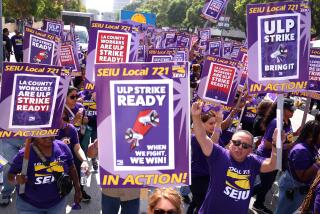Good for guards, and us
Labor agreements are usually private affairs, resulting from give-and-take bargaining between management and workers. Yet such accords often benefit the public at large, and rarely is that more clearly the case than in the recently concluded tentative agreement between commercial property managers and a union representing thousands of security officers.
Security has become ever more important in the post-9/11 world. The private officers who guard skyscrapers and other commercial buildings are no substitute for police, firefighters or paramedics, but they are crucial links in the public safety chain. They are the first responders in case of a disaster, and they’re the people who shepherd sworn officers through the mazes of entrances and staircases and ultimately to the places they’re needed.
But security has long been an unstable field, with a huge turnover of officers due in part to low wages and benefits. An agreement announced this week -- and scheduled to be voted on by members of the security officers union Saturday -- would help keep experienced officers on the job.
It also would boost their pay by about 40%. Building managers may well pass those costs along to tenants, who are among the beneficiaries of a more stable security force. But that pay boost goes further -- right into the lagging economy of South Los Angeles.
That’s because a huge proportion of L.A.’s private security officers are African Americans living south of the Santa Monica Freeway. Over the decades, many blacks in Los Angeles lost well-paying working-class jobs to Latino immigrants, including those who now form the backbone of the Service Employees International Union Local 1877 -- the janitors union. So it’s noteworthy that the same union sought to get African Americans back into the labor movement by organizing the security guards.
Poverty remains an agonizing fact of life in Los Angeles, particularly in neighborhoods that have yet to see the fruit of the region’s construction boom. The accord between managers of commercial buildings -- many of them in downtown -- and security guards carries the added benefit of pumping higher wages into the South Los Angeles economy, by way of the 4,000 or so officers who live in the area.
More to Read
Sign up for Essential California
The most important California stories and recommendations in your inbox every morning.
You may occasionally receive promotional content from the Los Angeles Times.










